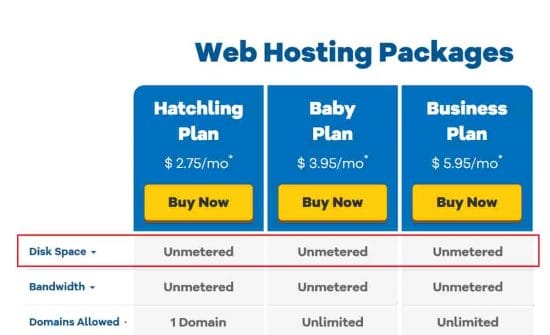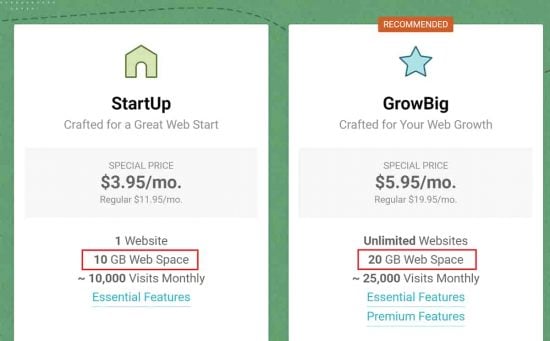If you look at the major web hosting companies, you’ll see that, except for Hostgator, they all have limitations on how much storage space they offer on their shared hosting plans. Hostgator is the only one to offer unlimited disk space. But how are they able to do this?
Best Hostgator Coupon
Here’s the best Hostgator coupon code list. Need to decide fast? Here’s the best Hostgator coupon code:
Duration: 12
months
Discount: 78%
Hostgator Coupon Code (Click to copy):
Table of Contents
Hostgator Unlimited Storage Space vs Others
Here’s a screenshot from Hostgator’s website where they advertise “unmetered” disk space:

Whether it’s genuinely unlimited is something I’ll discuss below. But just for comparison, here’s the same thing from SiteGround:

Similarly, other web hosts like Bluehost also limit the amount of storage space they allow on their shared hosting plans. Here’s a list of web hosts with unlimited storage to help you choose.
So why this discrepancy? What allows Hostgator to offer unlimited storage while the others are limited?
The Answer: SSD Drives vs HDD Drives
The big difference between Hostgator and the other web hosts is that the former uses HDD drives instead of SSD for its shared hosting plans. It’s a complicated subject, and I’ve written earlier about why Hostgator doesn’t use SSDs when all the others are doing so.
One of the primary reasons Hostgator uses HDD drives instead of SSDs is to provide unlimited or unmetered disk space to their clients. It also allows them to keep the prices down, to reduce the overall cost of hosting. The web hosting industry is moving to a higher price point in general. I’d written earlier about how Bluehost’s rising prices, and I do not doubt that SSD drives are one component.
So far, Hostgator is still the cheapest of all the major hosting providers. And I suspect a big reason is their usage of HDD drives to keep costs down. On the other extreme, you have web hosts that use NVMe drives instead of SSDs, and NVMe drives are even faster than SSDs but are more expensive. Here’s a list of the best NVMe hosting providers.
Won’t HDD Slow Down my Site?
Not necessarily – or at least not to any significant degree. In the first place, Hostgator uses SSD drives for its MySQL database storage. This means that the most significant impact of SSD drives is still valid for the vast majority of dynamically driven websites. Even without this, the benefits of SSD drives are often overrated, but that’s another story.
The bottom line is that since Hostgator uses SSDs for database operations, the only things that remain on HDD are your files. And those are far less important when rendering a site than the database.
What does “Unmetered” Truly Mean?
You should know that Hostgator doesn’t allow you to store unlimited data on their shared hosting services. If you use too much, they will suspend your account, and that’s that. Any data directly associated with your site’s functioning is acceptable, but you can’t use it as a file dump for terabytes of data. This is one of the reasons some hosting providers specify a hard limit on their disk space allowances. It avoids the judgment calls that Hostgator has to make when determining if a particular account is abusing the system.
In short, be sensible. If you’re trying to game the system, sooner or later, you’ll be ousted. If you ever need to ask yourself, “Is this allowed?” the answer is probably no!
What About Hostgator’s Terms of Service?
As Daniel points out in the comment below, Hostgator mentions in the terms of service that it has the following limitations on storage:
- iNode count has to be less than 200,000
- Can’t have more than 5000 tables
- Can’t have more than 10 GB of total database usage
- No single table can be more than 5 GB
These are certainly storage limitations. But it’s important to point out that these limitations don’t apply to file disk usage. The first limitation is on the number of files – 200,000 iNodes. To put this in perspective, I have three websites that use 30,000 files. Granted, only two of them are “serious”, but that means I can have around 15 medium-sized websites and still not hit the limit of 200,000 files.
If you have that many sites, you shouldn’t be relying on shared hosting. A VPS would suit you much better, and you won’t have to worry about any file number restrictions. Here’s how to upload your website to HostGator.
Hostgator Database Storage Restrictions
It might seem that Hostgator has pretty severe database restrictions. However, most of the storage is taken up by files – not the database. For context, the database size for WP-Tweaks right now is just under 20 MB with 77,000 rows. Let’s say a larger site has even 1 GB. That’s still very far from the storage restriction of 10 GB total storage. And it’s almost impossible for a regular site to have a storage of 5 GB.
So these Hostgator disk space restrictions are at the very outer limits of what we can reasonably expect from a website. If it’s anything more than this, your site falls entirely out of the expected parameters. And in such situations, a VPS is probably your best bet.
Hostgator Shared Hosting: $2.57/m
Hurry! Get 78% off on Hostgator.
Will Hostgator Retain Unmetered Disk Space in the Future?
I think it will, yes. Hostgator’s unlimited marketing strategy seems to be a differentiator in a crowded industry, so I don’t see why that will change. The overwhelming majority of their customers don’t have a problem with getting suspended or banned, so it seems to be working for them.
And as long as they use HDDs instead of SSD for file storage, it’ll allow them to keep costs low as well


After getting a warning email from GoDaddy that I had a week to clean up my website, and after they shut it down when I didn’t move fast enough, I’ve been looking for a hosting that will allow me to maintain an extensive media library of audio files. What I have found is that all of those who say “unmetered” or “unlimited” have something like this hidden in the terms of service:
“Similarly, accounts with an excessive number of database tables (in excess of 5000 database tables) or an excessive database size (in excess of 10GB total database usage or 5GB database usage in a single database) negatively affect the performance of the server. In the event that you exceed these amounts, HostGator may request that you reduce the number of files/inodes, database tables, or total databases to ensure optimal server performance.”